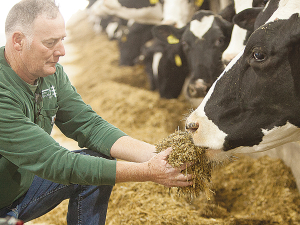Formula goes sour
OPINION: Media reports say global recalls tied to cereulide toxin contamination in milk-based nutrition brands could inflict combined financial losses exceeding $1 billion.
 In the US, Nestlé is facilitating research to assess the efficacy of feed supplements, which have the potential to reduce enteric methane emissions.
In the US, Nestlé is facilitating research to assess the efficacy of feed supplements, which have the potential to reduce enteric methane emissions.
The world's second largest dairy company, Nestle, says it is exploring different approaches to reduce dairy's greenhouse gas emissions.
The company says it is working with farmers, suppliers, leading universities, industry organisations, start-ups and local governments to research, test, validate, and scale up different agricultural solutions and technologies, including for dairy livestock.
In a message to mark World Milk Day on June 1, the company noted that one area of research is on feed supplements that can reduce methane emissions from enteric fermentation - the cow's digestion process and the largest source of emissions in fresh milk production.
In the United States, for instance, Nestlé is facilitating research to assess the efficacy and the human, animal and environmental health and safety aspects of feed supplements, which have the potential to reduce enteric methane emissions. The second biggest source of greenhouse gas emissions on a dairy farm is from the feed for cows, for example, from its production, storage, and disposal.
Nestlé is working with farmers to implement regenerative agriculture practices, such as the introduction of cover crops or more widespread use of organic fertilisers, in the production of feed to cut emissions. Farmers on one of Nestlé’s pilot farms in South Africa, for instance, are growing their own multispecies pasture for animal feed while reducing the use of chemical fertilisers.
“This helps improve soil quality, which enables more carbon capture,” the company says.
The company also supports farmers in calculating exactly how much feed cows need based on factors like weight, age, and gestation period to reduce overfeeding and waste.
“Better manure management will also help reduce dairy farm emissions. In Mexico, cow manure is separated into liquids and solids. The solids are composted and returned to the soil while the liquid is incorporated into the irrigation system.”
In addition to these approaches, Nestlé is working with many more dairy farmers around the world. Through over 100 full-scale climate projects, farmers are planting trees on existing pastures, introducing multiple species on pastures, establishing new pastures in woodlands (silvopasture), rotating the land where cows graze, collecting and storing manure, and adopting more renewable sources of energy.
In Brazil, Nestlé is working with more than 1500 dairy farmers to adopt more animalfriendly housing systems, cover cropping and more renewable sources of energy as well as practices to help conserve water. Nestlé is helping small and medium-sized farmers in Pakistan increase their efficiencies through low-stress housing for animals, farmer capacity building and solar and biogas energy, among others. In Chile, Nestlé is working with farmers to improve pasture yields through multi-species pastures, rotational grazing, and pasture management, while helping them improve nitrogen use efficiency.
Researchers at the company’s recently inaugurated Institute of Agricultural Sciences look for ways to reduce emissions, while considering the nutritional quality of milk, food safety, regulatory compliance, and animal welfare.
Nestle says the effectiveness of new technologies and approaches are evaluated on multiple research farms all over the world. Before being scaled up, they need to prove to be operationally feasible and economically viable for farmers.</p.
“There is no one-sizefits all approach. Different practices and different solutions need to be applied in different combinations depending on an individual farm’s crops, livestock, environment, soil type, and many other factors.
“Solutions to reduce dairy emissions will be essential in Nestlé’s journey to reach net zero greenhouse gas emissions by 2050,” it says.
Recent weather events in the Bay of Plenty, Gisborne/Tairawhiti, and Canterbury have been declared a medium-scale adverse event.
DairyNZ's chief executive Campbell Parker says the 2024/25 dairy season reinforces the importance of the dairy sector to New Zealand.
A New Zealand agribusiness helping to turn a long-standing animal welfare and waste issue into a high-value protein stream has won the Australian dairy sector's top innovator award.
OPINION: A bumper season all around.
Dairy Women's Network (DWN) has announced that Taranaki dairy farmer Nicola Bryant will join its Trust Board as an Associate Trustee.
Rural Women New Zealand (RWNZ) says it welcomes the release of a new report into pay equity.
OPINION: Staying with politics, with less than nine months to go before the general elections, there’s confusion in the Labour…
OPINION: Winston Peters' tirade against the free trade deal stitched with India may not be all political posturing by the…